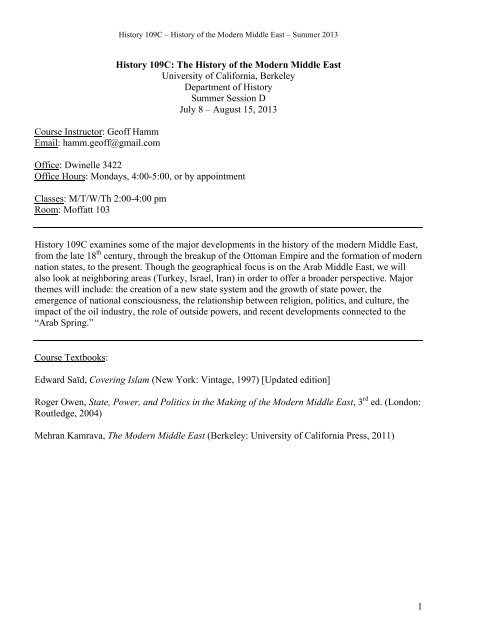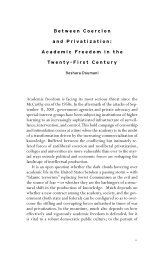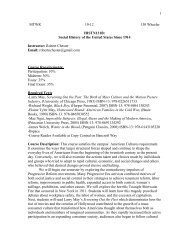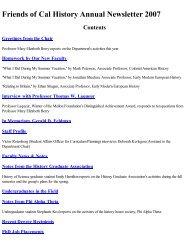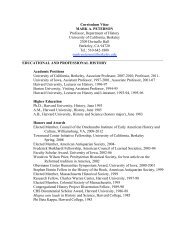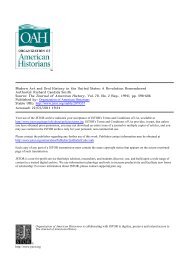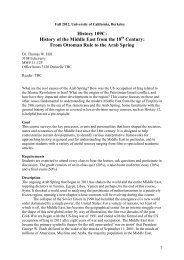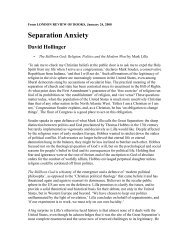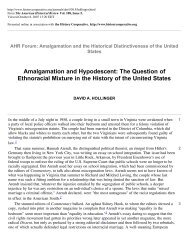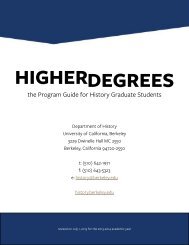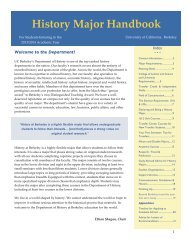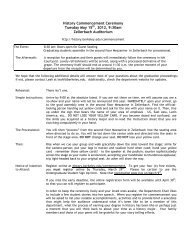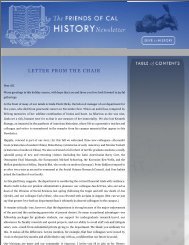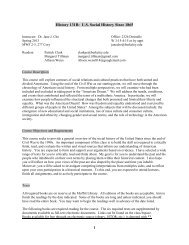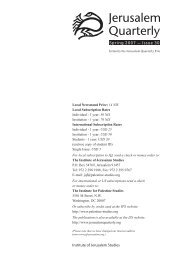History 109C Middle East Syllabus.pdf - Department of History, UC ...
History 109C Middle East Syllabus.pdf - Department of History, UC ...
History 109C Middle East Syllabus.pdf - Department of History, UC ...
Create successful ePaper yourself
Turn your PDF publications into a flip-book with our unique Google optimized e-Paper software.
<strong>History</strong> <strong>109C</strong> – <strong>History</strong> <strong>of</strong> the Modern <strong>Middle</strong> <strong>East</strong> – Summer 2013Course Instructor: Ge<strong>of</strong>f HammEmail: hamm.ge<strong>of</strong>f@gmail.com<strong>History</strong> <strong>109C</strong>: The <strong>History</strong> <strong>of</strong> the Modern <strong>Middle</strong> <strong>East</strong>University <strong>of</strong> California, Berkeley<strong>Department</strong> <strong>of</strong> <strong>History</strong>Summer Session DJuly 8 – August 15, 2013Office: Dwinelle 3422Office Hours: Mondays, 4:00-5:00, or by appointmentClasses: M/T/W/Th 2:00-4:00 pmRoom: M<strong>of</strong>fatt 103<strong>History</strong> <strong>109C</strong> examines some <strong>of</strong> the major developments in the history <strong>of</strong> the modern <strong>Middle</strong> <strong>East</strong>,from the late 18 th century, through the breakup <strong>of</strong> the Ottoman Empire and the formation <strong>of</strong> modernnation states, to the present. Though the geographical focus is on the Arab <strong>Middle</strong> <strong>East</strong>, we willalso look at neighboring areas (Turkey, Israel, Iran) in order to <strong>of</strong>fer a broader perspective. Majorthemes will include: the creation <strong>of</strong> a new state system and the growth <strong>of</strong> state power, theemergence <strong>of</strong> national consciousness, the relationship between religion, politics, and culture, theimpact <strong>of</strong> the oil industry, the role <strong>of</strong> outside powers, and recent developments connected to the“Arab Spring.”Course Textbooks:Edward Saïd, Covering Islam (New York: Vintage, 1997) [Updated edition]Roger Owen, State, Power, and Politics in the Making <strong>of</strong> the Modern <strong>Middle</strong> <strong>East</strong>, 3 rd ed. (London:Routledge, 2004)Mehran Kamrava, The Modern <strong>Middle</strong> <strong>East</strong> (Berkeley: University <strong>of</strong> California Press, 2011)1
<strong>History</strong> <strong>109C</strong> – <strong>History</strong> <strong>of</strong> the Modern <strong>Middle</strong> <strong>East</strong> – Summer 2013EVALUATIONParticipation: Because many <strong>of</strong> the issues engaged in this course resonate with contemporaryevents in the <strong>Middle</strong> <strong>East</strong>, at least 2 hours <strong>of</strong> class time per week will be devoted to seminardiscussion. Discussions will be based on lectures and specific readings, with the expectation thatstudents will come to class having already prepared the material. Where possible/appropriatereadings will engage some <strong>of</strong> the – <strong>of</strong>ten heated – historiographical and political debates on thesubject matter. Students must participate actively in these discussions; silent attendance will not berewarded.Value: 15%Media Analysis: Students will read Edward Saïd’s Covering Islam and write an approximately 3page (750 word) review <strong>of</strong> a relevant film/news story/TV show/comic book etc. The review mightengage some <strong>of</strong> the following questions (though these are suggestions and are neither a checklist <strong>of</strong>issues to discuss, nor are they the only questions students might consider): How does the “article”‘cover Islam’? Does the “article” fit the pattern described by Saïd? Is his critique unfair? Is theremore nuance to the issue than his work allows for? Students may not write on any films shown inclass. The assignment will be due in class THURSDAY, JULY 25.Value: 20%Term Essay: Students must write a research essay <strong>of</strong> approximately 10 pages (2500 words) inlength. The paper must include proper source documentation and bibliography, and should attemptto analyze a relevant topic in the history <strong>of</strong> the modern <strong>Middle</strong> <strong>East</strong>. While students are free tochoose their own topic, consultation with the instructor is encouraged. Proper citation format andother related information will be discussed in class/posted on the course website. The essay will bedue in class THURSDAY, AUGUST 8.Value: 40%Final Exam: Format T.B.D. Exam will be held THURSDAY, AUGUST 15 during normal classhours.Value: 25%2
<strong>History</strong> <strong>109C</strong> – <strong>History</strong> <strong>of</strong> the Modern <strong>Middle</strong> <strong>East</strong> – Summer 2013GUIDELINES FOR WRITTEN ASSIGNMENTS• All assignments must be turned in as hard copy, unless special circumstances and previousapproval from the instructor mitigate.• All assignments are due at the start <strong>of</strong> class. Late assignments will be penalized 3% percalendar day.• All assignments should include a title page that includes your name, student number, email,and course.• All assignments must be double-spaced using 12-point font (10 point font forfootnotes/endnotes).• All assignments must, where appropriate, contain proper footnotes/endnotes and abibliography.• While there is no prescribed number <strong>of</strong> footnotes and sources for the research essay,students should make every effort to use as many sources as possible. Sources should alsobe academic, whether printed or digital. Reference sources such as (but not limited to)Wikipedia, and popular non-fiction works are not acceptable.• All assignments must conform to the <strong>UC</strong> Berkeley Student Code <strong>of</strong> Conduct regardingacademic honesty. Details can be found in Appendix II <strong>of</strong> the Student Code <strong>of</strong> Conduct,which can be downloaded here:http://sa.berkeley.edu/conduct/code-<strong>of</strong>-conduct/printableClassroom EtiquetteStudents are asked to respect the decorum <strong>of</strong> the classroom and shut <strong>of</strong>f their cell phonesand other electronic media devices. Under no circumstances should students be sending orreceiving phone calls or text messages during class. Students whose pockets, bags, orbackpacks begin buzzing, ringing, chirping, tweeting, or otherwise disrupting class sessionswill be asked to leave the classroom for the rest <strong>of</strong> the day. Repeated incidents <strong>of</strong> this naturewill incur a penalty <strong>of</strong> up to 10% <strong>of</strong> the student’s final grade.3
<strong>History</strong> <strong>109C</strong> – <strong>History</strong> <strong>of</strong> the Modern <strong>Middle</strong> <strong>East</strong> – Summer 2013LECTURE & READING SCHEDULEWEEK 1Monday July 8• Introduction/Course Policies• The <strong>Middle</strong> <strong>East</strong> and the Muslim World in the 18 th century§ Mehran Kamrava, The Modern <strong>Middle</strong> <strong>East</strong>, Chapter 1.§ Bernard Lewis, The Shaping <strong>of</strong> the Modern <strong>Middle</strong> <strong>East</strong> (New York: OxfordUniversity Press, 1994), Chapter 1. [Course Website]§ Watch the following interview with Edward Saïd as he discusses hislandmark study, Orientalism. The interview is approximately 40 minuteslong. [Link on Course Website]Tuesday July 9• The “Sick Man <strong>of</strong> Europe”? The Ottoman Empire and the Great Powers§• SeminarWednesday July 10Roderic Davison, “Foreign and Environmental Contributions to PoliticalModernization <strong>of</strong> Turkey,” in Davison, Essays in Ottoman and Turkish<strong>History</strong>, 1774-1923 (Austin: University <strong>of</strong> Texas Press, 1990), Chapter 5.[Course Website]§ Winfried Baumgart, The Crimean War, 1853-1856 (London: Arnold, 1999),pp.3-8, 211-12. [Course Website]• Ottoman Society and Politics in the Era <strong>of</strong> Reform§ Bruce Masters, “The Political Economy <strong>of</strong> Aleppo in an Age <strong>of</strong> OttomanReform”, Journal <strong>of</strong> the Economic and Social <strong>History</strong> <strong>of</strong> the Orient 53(2010), 290-316. [Course Website]• Religion, Economics and Popular Culture in the Ottoman Empire§ Frederick Anscombe, “Islam and the Age <strong>of</strong> Ottoman Reform”, Past &Present 208 (August 2010), 159-189. [Course Website]4
<strong>History</strong> <strong>109C</strong> – <strong>History</strong> <strong>of</strong> the Modern <strong>Middle</strong> <strong>East</strong> – Summer 2013Thursday July 11• Minorities in the Ottoman Empire§ Daniel J. Schroeter, “The Changing Relationship between the Jews <strong>of</strong> theArab <strong>Middle</strong> <strong>East</strong> and the Ottoman State in the Nineteenth Century” inAvigdor Levy, ed. Jews, Turks, Ottomans: A Shared <strong>History</strong> (Syracuse:University Press, 2002), 88-107. [Course Website]• SeminarWEEK 2Monday July 15• Union and Progress: The Young Turk Revolution§ Feroz Ahmad, “War and Society Under the Young Turks, 1908-1918”,Review (Fernand Braudel Center), 11, 2 (Spring 1988), 265-286. [CourseWebsite]• Film: The First Word War (PBS) Episode 5: “Jihad: The <strong>History</strong> <strong>of</strong> Turkey’sInvolvement in WWI”§ Hew Strachan, The First World War: To Arms (Oxford: University Press,2002) pp. 680-712. [Electronically Available through Oskicat]Tuesday July 16• States and Mandates: The <strong>Middle</strong> <strong>East</strong> after WWI§ Mehran Kamrava, The Modern <strong>Middle</strong> <strong>East</strong>, Chapter 2.• SeminarWednesday July 17• Guest Lecture: The Armenian Genocide§ “Nearly a Million Genocide Victims – Covered in a Cloak <strong>of</strong> Amnesia,”New York Times, March 9, 2009 [Course Website]§ G.S. Graber, Caravans to Oblivion: The Armenian Genocide, 1915 (NewYork: John Wiley, 1996), Chapter 9-10. [Course Website]§ Donald Bloxham, “Rethinking the Armenian Genocide”, <strong>History</strong> Today 55,6 (June 2005), 28-30. [Course Website]5
<strong>History</strong> <strong>109C</strong> – <strong>History</strong> <strong>of</strong> the Modern <strong>Middle</strong> <strong>East</strong> – Summer 2013Thursday July 18• Kemal Ataturk and the birth <strong>of</strong> Modern Turkey§ Dankwart A. Rustow, “The Army and the Founding <strong>of</strong> the TurkishRepublic”, in Touraj Atabaki and Erik J. Zürcher eds. Men <strong>of</strong> Order:Authoriarian Modernization under Atatürk and Reza Shah (London: I.B.Tauris, 2004), 164-208. [Electronically available through OskiCat]• SeminarWEEK 3Monday July 22• The Independence and Growth <strong>of</strong> Arab States (2 parts)§ Roger Owen, State, Power and Politics in the Making <strong>of</strong> the Modern <strong>Middle</strong><strong>East</strong>, Chapter 1.Tuesday July 23• The Rise <strong>of</strong> <strong>Middle</strong> <strong>East</strong>ern Strong Men: Egypt, Syria, Iraq§ Roger Owen, State, Power, and Politics, Chapter 3.• SeminarWednesday July 24• Nasser, Pan-Arabism, and the 1967 War§ Roger Owen, State, Power, and Politics, Chapter 4.§ Mehran Kamrava, The Modern <strong>Middle</strong> <strong>East</strong>, Chapter 3.§ John F. Devlin, “The Baath Party: Rise and Metamorphosis”, The AmericanHistorical Review 96, 5 (December 1991), 1396-1407. [Course Website]• The Ba’th Party and Authoritarian Rule in Syria and Iraq: Hafiz al-Asad and SaddamHussein§ Robert Springborg, “Baathism in Practice: Agriculture, Politics, and PoliticalCulture in Syria and Iraq”, <strong>Middle</strong> <strong>East</strong>ern Studies 17, 2 (April 1981), 191-209. [Course Website]§ Ofra Bengio, “How Does Saddam Hold On?”, Foreign Affairs 79, 4 (July-August 2000), 90-103. [Course Website]6
<strong>History</strong> <strong>109C</strong> – <strong>History</strong> <strong>of</strong> the Modern <strong>Middle</strong> <strong>East</strong> – Summer 2013Thursday July 25• Israel: Politics and Society since 1948§ Roger Owen, State, Power, and Politics, Chapter 5.§ David Remnick, “The Party Faithful: The settler’s move to annex the WestBank – and Israeli politics.” The New Yorker, January 21, 2013. [CourseWebsite]• SeminarWEEK 4Monday July 29• The Rise <strong>of</strong> Political Islam§ Roger Owen, State, Power, and Politics, Chapter 9.§ William Oschenwald, “Saudi Arabia and the Islamic Revival”, InternationalJournal <strong>of</strong> <strong>Middle</strong> <strong>East</strong> Studies 13, 3 (August 1981), 271-286. [CourseWebsite]• Oil and Economics in the <strong>Middle</strong> <strong>East</strong>§ Mehran Kamrava, The Modern <strong>Middle</strong> <strong>East</strong>, Chapter 8.§ Peter Sluglett, Britain in Iraq: Contriving King and Country (New York:Columbia University Press, 2007), Chapter 3.Tuesday July 30• Women, Islam, and the State§ Nadia Hijab, “Islam, Social Change, and the Reality <strong>of</strong> Arab Women’sLives”, in Yvonne Yazbeck Haddad and John L. Esposito eds., Islam,Gender, and Social Change (New York: Oxford University Press, 1998), 45-55.§ Margot Badran, “Islamic Feminism: What’s in a Name”, and “IslamicFeminism Revisited”, in Badran, Feminism Beyond <strong>East</strong> and West: NewGender Talk and Practice in Global Islam (New Dehli: Global Media,2007), 23-45. [Course Website]• Seminar7
<strong>History</strong> <strong>109C</strong> – <strong>History</strong> <strong>of</strong> the Modern <strong>Middle</strong> <strong>East</strong> – Summer 2013Wednesday July 31• Iran, ca. 1900-1979§ Michael P. Zirinsky, “Imperial Power and Dictatorship: Britain and the rise<strong>of</strong> Reza Shah, 1921-1926”, International Journal <strong>of</strong> <strong>Middle</strong> <strong>East</strong> Studies 24,4 (November 1992), 639-663. [Course Website]• Iran since 1979§ Mehran Kamrava, The Modern <strong>Middle</strong> <strong>East</strong>, Chapter 5.§ Saïd Amir Arjomand, After Khomeini: Iran under his successors (Oxford:University Press, 2009), 149-171. [Electronically available through OskiCat]Thursday August 1• Film & Discussion: PersepolisWEEK 5Monday August 5• The Palestinian Problem§ Mehran Kamrava, The Modern <strong>Middle</strong> <strong>East</strong>, Chapter 7.§ Thomas M. Ricks, “In Their Own Voices: Palestinian High School Girls andTheir Memories <strong>of</strong> the Intifadas and Nonviolent Resistance to IsraeliOccupation, 1987-2004”, NWSA Journal 18, 3 (Fall 2006), 88-103. [CourseWebsite]• Office Hour: Term Paper ConsultationTuesday August 6• Arab-Israeli Conflict and the <strong>Middle</strong> <strong>East</strong> “Peace Process”§ Mehran Kamrava, The Modern <strong>Middle</strong> <strong>East</strong>, Chapter 4.§ Scott Lasensky, “Paying for Peace: The Oslo Process and the Limits <strong>of</strong>American Foreign Aid”, <strong>Middle</strong> <strong>East</strong> Journal 58, 2 (Spring 2004), 210-234.[Course Website]• SeminarWednesday August 7• The United States and the <strong>Middle</strong> <strong>East</strong>§ Roger Owen, State, Power, and Politics, Chapter 12.8
<strong>History</strong> <strong>109C</strong> – <strong>History</strong> <strong>of</strong> the Modern <strong>Middle</strong> <strong>East</strong> – Summer 2013§Ussama Makdisi, “‘Anti-Americanism’ in the Arab World: An Interpretation<strong>of</strong> a Brief <strong>History</strong>”, The Journal <strong>of</strong> American <strong>History</strong>, 89, 2 (September2002), 538-557. [Course Website]• The Persian Gulf Wars, 1991-2003§ Roger Owen, State, Power, and Politics, Chapter 6.§ Mehran Kamrava, The Modern <strong>Middle</strong> <strong>East</strong>, Chapter 6.Thursday August 8• Film & Discussion: TBDWEEK 6Monday August 12• Islamic and <strong>Middle</strong> <strong>East</strong>ern Terrorism§• SeminarTuesday August 13John L. Esposito, Unholy War: Terror in the Name <strong>of</strong> Islam (Oxford:University Press, 2002), Chapter 1. [Electronically Available throughOskicat]§ Fawaz Gerges, The Far Enemy 2 nd ed. (Cambridge: University Press, 2009),119-150. [Electronically Available through Oskicat]• The <strong>Middle</strong> <strong>East</strong> in the Post 9/11 World§ Roger Owen, State, Power, and Politics, Conclusion.§ Bernard Lewis, “Free at Last? The Arab World in the Twenty-FirstCentury”, Foreign Affairs 88, 2 (March/April 2009), 77-88. [CourseWebsite]• The Arab Spring§ Lisa Anderson, “Demystifying the Arab Spring”, Foreign Affairs 90, 3(May/June 2011), 2-7. [Course Website]9
<strong>History</strong> <strong>109C</strong> – <strong>History</strong> <strong>of</strong> the Modern <strong>Middle</strong> <strong>East</strong> – Summer 2013Wednesday August 14• Seminar• Final Exam ReviewThursday August 15: FINAL EXAM10


